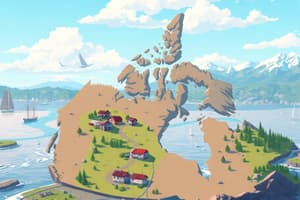Podcast
Questions and Answers
What does a sense of place primarily instill in individuals?
What does a sense of place primarily instill in individuals?
- Political ideology
- Feelings for their living area (correct)
- Economic strategies
- Global recognition
What characterizes Canada's geographic regions?
What characterizes Canada's geographic regions?
- They have no relation to demographics.
- They are randomly defined.
- They are based on several subjective factors. (correct)
- They are static and unchanging.
Which of the following is NOT one of Canada's geographic regions?
Which of the following is NOT one of Canada's geographic regions?
- Central Canada (correct)
- Atlantic Canada
- Western Canada
- Territorial North
What role does the core/periphery model play in understanding regions?
What role does the core/periphery model play in understanding regions?
Which factor does NOT drive the dynamic nature of regions?
Which factor does NOT drive the dynamic nature of regions?
Why are Canada's regions divided into six distinct sections?
Why are Canada's regions divided into six distinct sections?
Which of the following represents the core in a geographic context?
Which of the following represents the core in a geographic context?
Which statement best describes the regions of Canada?
Which statement best describes the regions of Canada?
What does geography primarily provide an understanding of?
What does geography primarily provide an understanding of?
How is Canada best understood in terms of geography?
How is Canada best understood in terms of geography?
What does the phrase 'Geography is Destiny' imply?
What does the phrase 'Geography is Destiny' imply?
What is a notable characteristic of Canada's six regions?
What is a notable characteristic of Canada's six regions?
What does the core/periphery model help to illustrate in Canadian geography?
What does the core/periphery model help to illustrate in Canadian geography?
What does the core/periphery model illustrate?
What does the core/periphery model illustrate?
Which of the following best defines a region in geographical terms?
Which of the following best defines a region in geographical terms?
What has been a source of tension between the Western Provinces and the federal government?
What has been a source of tension between the Western Provinces and the federal government?
Which group is included in the definition of Indigenous peoples in Canada?
Which group is included in the definition of Indigenous peoples in Canada?
What concept is a cornerstone of regional geography according to personal experiences within regions?
What concept is a cornerstone of regional geography according to personal experiences within regions?
What is the significance of a sense of place?
What is the significance of a sense of place?
What are faultlines in a geographical context?
What are faultlines in a geographical context?
Why is it challenging for geographers to classify Canada into distinct regions?
Why is it challenging for geographers to classify Canada into distinct regions?
In the core/periphery model, which region is likely to be considered part of the core in Canada?
In the core/periphery model, which region is likely to be considered part of the core in Canada?
Which of the following statements is true about Indigenous peoples in Canada?
Which of the following statements is true about Indigenous peoples in Canada?
What has contributed to the ease of belonging for English and French speaking immigrants in Canada?
What has contributed to the ease of belonging for English and French speaking immigrants in Canada?
What impact does the continuous influx of newcomers have on Canadian society?
What impact does the continuous influx of newcomers have on Canadian society?
What has historically marginalized Indigenous individuals in Canada?
What has historically marginalized Indigenous individuals in Canada?
When did economic and social opportunities become more available to Indigenous peoples?
When did economic and social opportunities become more available to Indigenous peoples?
What has been a notable factor in the relationship between the state and Indigenous peoples in Canada?
What has been a notable factor in the relationship between the state and Indigenous peoples in Canada?
What is one major source of tension between 'have' and 'have-not' provinces in Canada?
What is one major source of tension between 'have' and 'have-not' provinces in Canada?
Which province prioritizes French as the official language within its jurisdiction?
Which province prioritizes French as the official language within its jurisdiction?
How has the proportion of French-speaking Canadians changed from 1867 to 2011?
How has the proportion of French-speaking Canadians changed from 1867 to 2011?
What is a significant factor contributing to the centralist/decentralist faultline in Canada?
What is a significant factor contributing to the centralist/decentralist faultline in Canada?
What does the future paradigm of political power in Canada suggest about Central Canada?
What does the future paradigm of political power in Canada suggest about Central Canada?
Which factor has made language protection a sensitive issue in Canada?
Which factor has made language protection a sensitive issue in Canada?
What is one concern of some francophone leaders in Québec?
What is one concern of some francophone leaders in Québec?
What role do oil-rich provinces like Alberta expect from Ottawa?
What role do oil-rich provinces like Alberta expect from Ottawa?
Flashcards are hidden until you start studying
Study Notes
Introduction to Regional Geography
- Geography is used to describe and explain lands, places, and people beyond our personal experience.
- Geography is often described as “destiny,” influencing an individual’s life chances, experiences, and opportunities.
- Our geographical location can impact our sense of place, which is the special and often intense feelings that people have for the area where they live.
- Canada is divided into six regions: Atlantic Canada, Quebec, Ontario, Western Canada (The Prairies), British Columbia, and the Territorial North, each having a unique sense of place and regional identity.
- Canada's economic success is strong, however there are tensions between regional and federal goals. The core/periphery model has been applied to explain these dynamics.
- The core/periphery model highlights the relationship between an economically developed center (core) and a less developed surrounding area (periphery).
- Canadian regional geography is dynamic and evolving, driven by cultural, demographic, economic, political, and technological changes.
Core/Periphery Model
- Core: An area where economic power, population, and wealth are concentrated.
- Periphery: An underdeveloped area surrounding the core.
Regional Geography Faultlines
- Centralist / Decentralist Faultline: Tension between Central Canada (Ontario and Québec) and other regions over federal policies like equalization payments and resource management.
- English-speaking / French-speaking Faultline: Quebec's unique language legislation (Bill 101) aims to protect French language and culture, leading to tensions with other regions.
- Newcomers and Old-Timers Faultline: Canada's immigration history leads to cultural differences and potential conflicts between newcomers and long-time residents.
- Indigenous Minority and the Non-Indigenous Majority Faultline: Indigenous peoples have faced systemic challenges and discrimination, resulting in economic and social disparities.
Key Terms
- Region: A distinctive geographical area characterized by human or natural conditions.
- Indigenous Peoples: Canadians whose ancestors lived in Canada before European arrival.
- Sense of Place: The special and often intense feelings people have for their region.
- Faultlines: Economic, social, and political divisions within regions and between people.
Studying That Suits You
Use AI to generate personalized quizzes and flashcards to suit your learning preferences.



